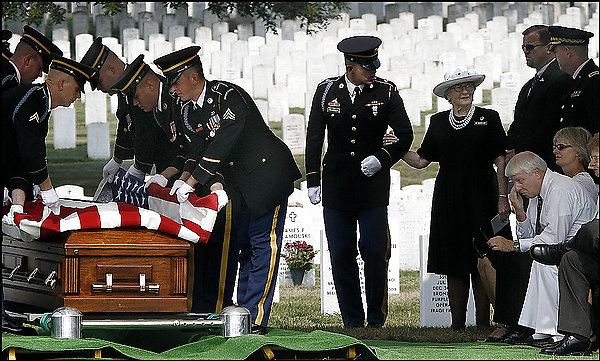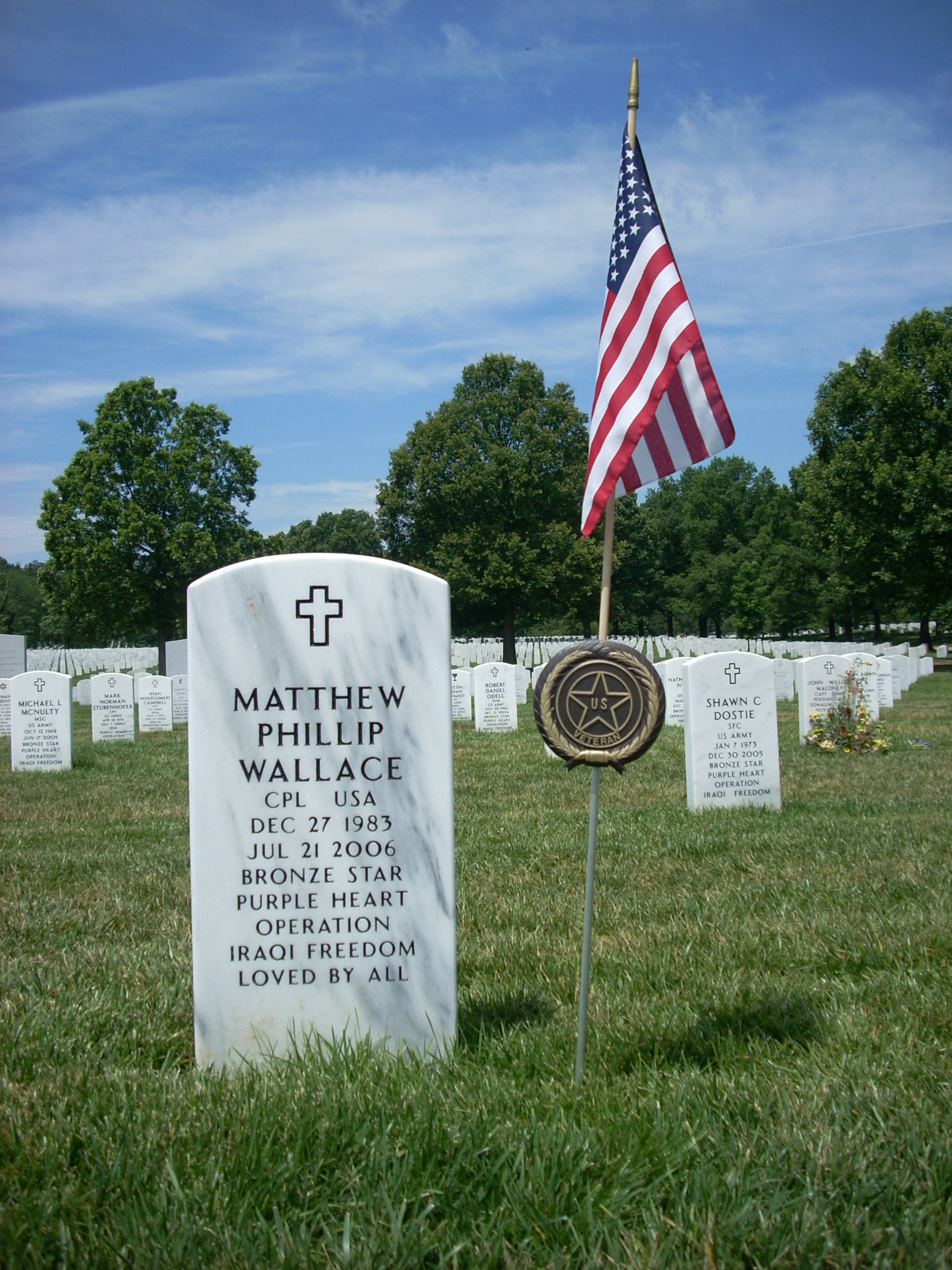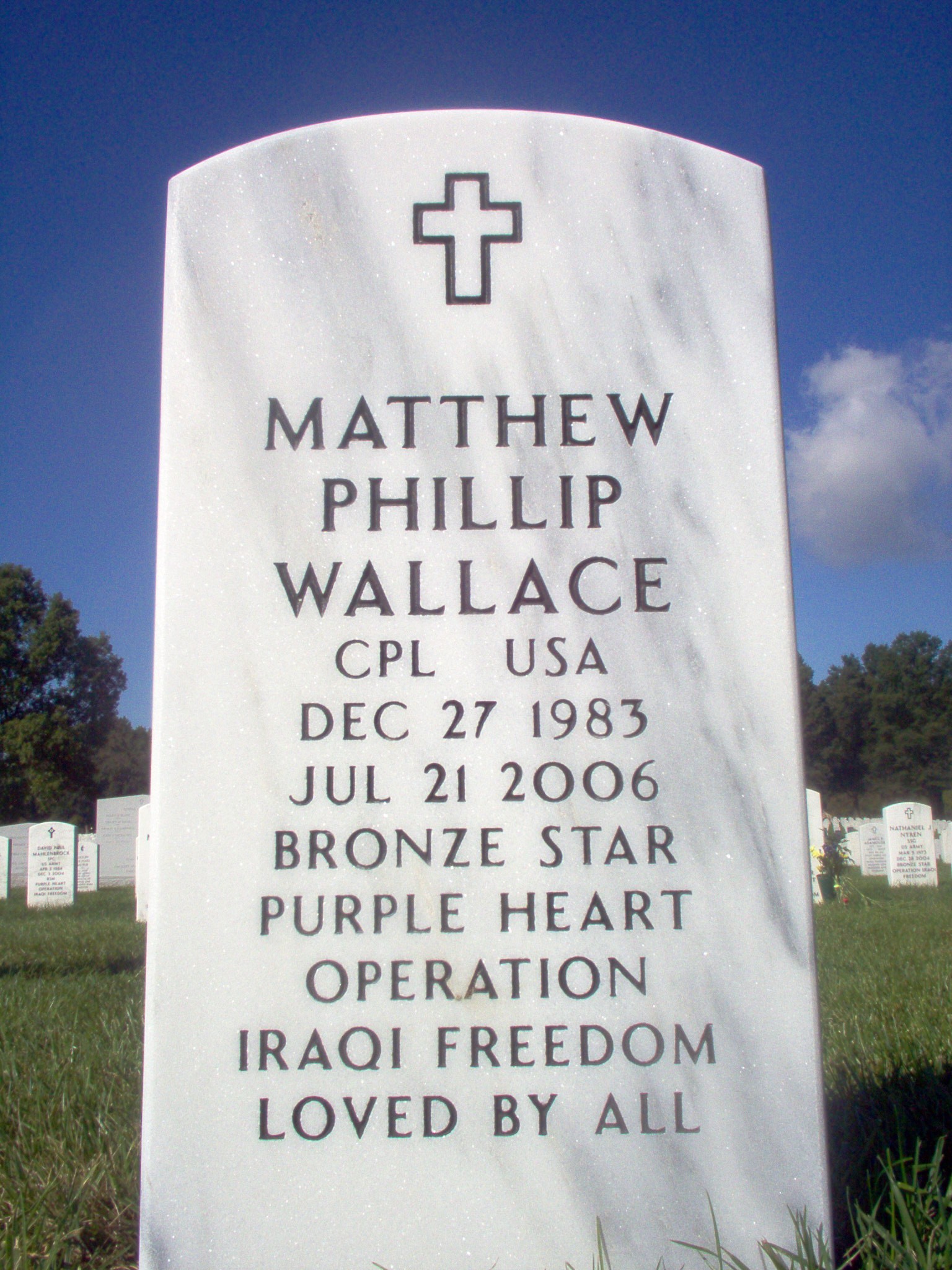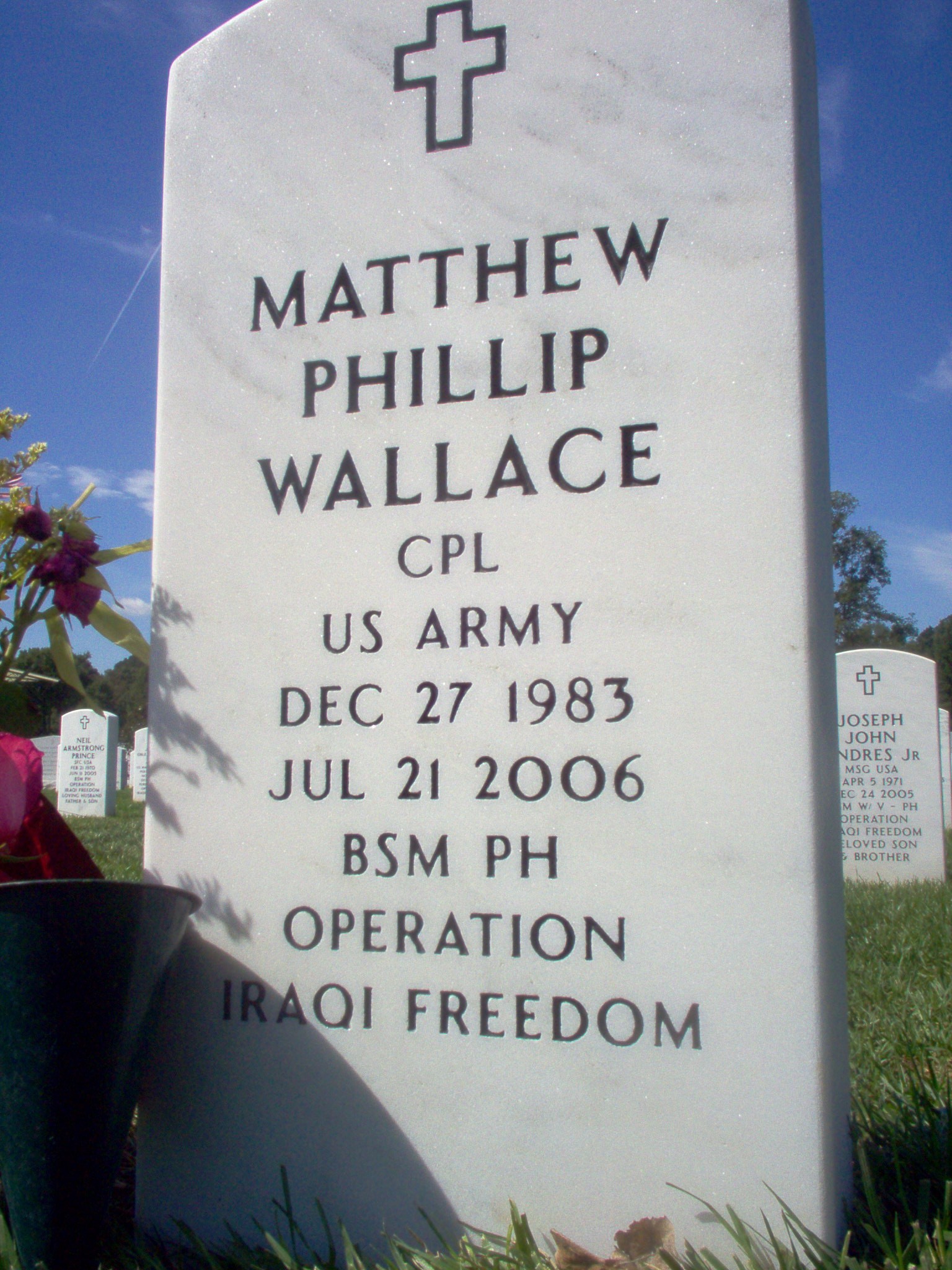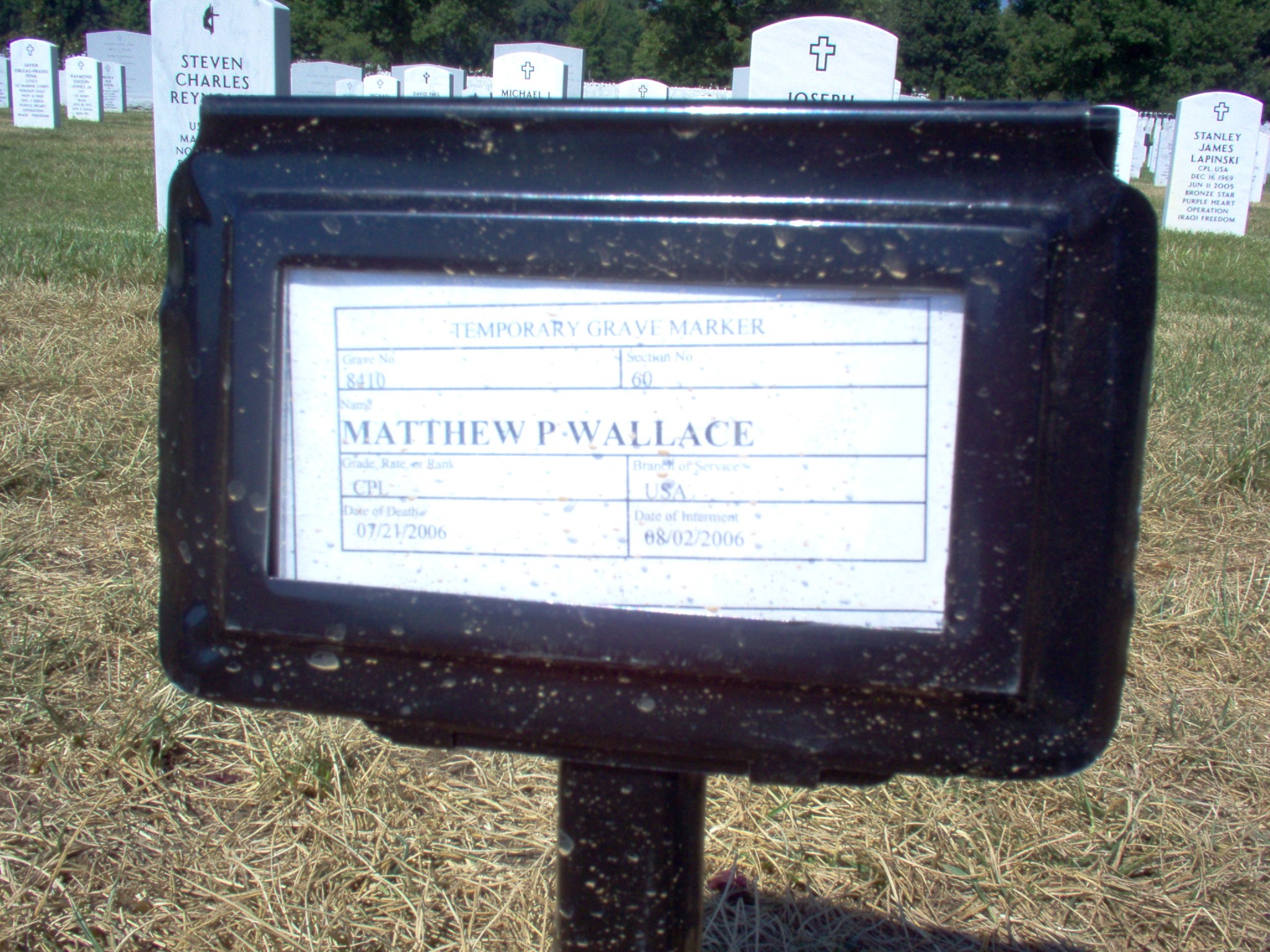NEWS RELEASES from the United States Department of Defense
No. 701-06 IMMEDIATE RELEASE
July 22, 2006
DoD Identifies Army Casualty
The Department of Defense announced today the death of a soldier who was supporting Operation Iraqi Freedom.
Corporal Matthew P. Wallace, 22, of Lexington Park, Maryland, died on July 21, 2006, in Landstuhl Regional Medical Center, Landstuhl, Germany, of injuries sustained when an improvised explosive device detonated near his Bradley Fighting Vehicle during combat operations in Baghdad, Iraq, on July 16. Wallace was assigned to the Army’s 10th Cavalry Regiment, 2nd Brigade Combat Team, 4th Infantry Division, Fort Hood, Texas.
Tributes to Sacrifice, Dedication
Soldier, Marine Fatally Wounded in Iraq Are Laid to Rest
By Arianne Aryanpur
Courtesy of the Washington Post Staff Writer
August 3, 2006
A motorcade led the funeral procession for Corporal Matt Wallace at Arlington National Cemetery yesterday. Six uniformed men carried Wallace’s black coffin to a gravesite in Section 60, where service members killed in Iraq and Afghanistan are laid to rest.
During the service, Army chaplain Lane Creamer spoke solemnly of sacrifice: “For the soldier, it is always duty, honor, country.” Soldiers then fired a three-volley salute while a bugler stood among the rows of white headstones and played taps.
Keith Wallace, right, at the funeral for his son Army Cpl. Matt Wallace, who died July 21 after an explosion in Baghdad
It was a fitting end for a man who wanted nothing more than to be a “soldier man” his whole life.
Wallace, 22, of St. Mary’s County, died July 21, 2006, at Landstuhl Regional Medical Center in Germany of burns sustained when an improvised explosive device detonated near his vehicle in Baghdad on July 16, 2006.
He was assigned to the Army’s 10th Cavalry Regiment, 2nd Brigade Combat Team, 4th Infantry Division at Fort Hood, Texas.
As a child growing up in St. Mary’s County, Wallace played with empty toilet paper rolls and clothes hangers, pretending they were toy guns. Family members said he went through a “self-discovery phase” and dropped out of Great Mills High School after his sophomore year. In 2001, he earned a General Educational Development diploma, and he joined the Army in 2004.
Wallace was 5 feet 10 inches tall and 135 pounds of “pure muscle,” his sister Abigail said. He played soccer and dabbled in karate. In Iraq, he trained on every weapons system possible, becoming a highly skilled soldier, she said.
Wallace’s mother, Mary, said he sounded weary the last time they spoke on the phone. “They were just working and working with little relief,” she said. But that was where he wanted to be, she added, her voice perking up. “He felt like he was doing what God thought he should do.”
Wallace is also survived by his father, Keith, and siblings Jessica and Micah.
A light breeze blew through the cemetery about 3 p.m. yesterday when mourners gathered at a gravesite next to Wallace’s to honor Marine Lance Corporal Geofrey Robert Cayer. The crowd included U.S. Senators John F. Kerry (D-Mass.) and Edward M. Kennedy (D-Mass.), who went to pay respects to the man from Fitchburg, Massachusetts. Military officials said Cayer, 20, died July 18,2006, in a nonhostile incident in Iraq’s Anbar province. He was assigned to the 3rd Battalion, 5th Marine Regiment, 1st Marine Division, I Marine Expeditionary Force at Camp Pendleton, California.
Cayer graduated from Fitchburg High School in 2004, where he played football and tennis. Principal Richard Masciarelli remembered him as focused and quiet. But when Cayer returned to visit the school after basic training, he appeared to be a different person, Masciarelli said. “He had really come into his own and was confident in himself as a young man,” he said.
Friends recalled Cayer as a great observer with a dry wit. “He always found humor in the oddest places,” said Chris LeBlanc, a family friend. “He would watch everything going on, and just when you were least expecting it, he’d say something funny.”
Those who knew Cayer spoke of a characteristic resolve. “He was there to do a job, and he took it very seriously,” LeBlanc said. “He was so happy to be a Marine.”
Cayer was scheduled to return from Iraq this month, according to news reports.
When Cayer’s service ended, Kerry and Kennedy offered condolences to his parents, Joan and Robert, and siblings, Charles, Alex and Abbigail.
Kerry placed a bouquet of white flowers on Cayer’s coffin and made the sign of the cross before walking back to his car, past the long rows of tombstones at Section 60.
Wallace and Cayer are the 254th and 255th service members killed in Operation Iraqi Freedom to be buried at Arlington.
24 December 2007
By: Laura Duffy
Courtesy of the Examiner
This is part of an occasional series of letters and stories about Maryland soldiers who have died in Iraq and Afghanistan.
Even as a boy, Matthew P. Wallace never knew what it was like to give up.
“He had a favorite pair of cowboy boots,” Mary Wallace said. “And he could never put them on the correct feet. But he kept on trying.”
That kind of determination — and the fact that he needed to be where the action was — drove the Lexington Park Army corporal to press his commanding officers for more responsibility — as a top gunman. They hesitated; Wallace was top-notch at both his jobs — as a technical operator and as his command sergeant’s driver. But his persistence paid off.
But after only a few months on the front lines in Iraq, the 22-year-old fell victim to a roadside bomb as his convoy was on a combat mission in Baghdad.
“He suffered horrible burns over 85 percent of his body,” his mother said.
The Wallaces learned about their son’s condition on July 16, 2006 while vacationing in North Carolina.
“I’m a nurse,” said Mary Wallace, who works at St. Mary’s Hospital in Leonardtown. “My heart was hopeful, but in my mind I knew his chances [of survival] were slim.”
Five days after being wounded, Wallace, with his family beside him, died in a hospital in Germany.
“He wasn’t blind to what he was getting involved with,” his mother said. “He was committed to this cause, and Matthew made this decision on his own.”
When Wallace enlisted in the Army, he left behind not only his family, but also his longtime best friend, Matthew Korade. They met at church when they were only 4 years old.
“We hated each other at first because we had the same name,” Korade said. “But he became my best friend. Whenever I had a problem, we’d just sit at the end of his driveway and talk. Now I’m alone.”
Korade had purchased tickets to a concert by the hard-rock band Tool, ready to surprise his best buddy on Wallace’s return. Instead, Korade went to Arlington National Cemetery, where Wallace is buried, and laid the tickets on his
grave.
“I hate leaving [the cemetery] knowing my best friend is still there,” Korade said.
‘He wiped my tear and thanked me for my sacrifice’
Matthew P. Wallace’s mother, Mary, wrote this article after seeing a young Marine and his boy saluting at her son’s grave in Arlington. It is featured on a Web site — The Fellowship of the Devastated — Mary created after losing her son. What follows is an edited excerpt.
It is easy to tell the difference. Some are there aimlessly walking, taking in the sites, seeing the National Treasures for perhaps the first time. They chat and laugh. Some with cameras snap self-portraits and pictures of loved ones near scenes made famous in movies and documentaries.
Then, there are those who wear the expressions of family members gathered outside an intensive care unit, waiting for the inevitable news. “Will I cry this time?” They enter from the road only to notice that it doesn’t look the same since they were there last. There are more! “Oh my God, there’s a whole new row! How is this possible? It just hasn’t been that long.” It’s true though. The latest additions are still missing markers and sod. Yet, there they are. On their knees weeping are the newest members of “The Fellowship of the Devastated.”
The newly initiated elicit pity from somewhere in the human soul bypassing even one’s own pain. They are still in the throes of shock, denial and devastation. I hugged a mom … She is relieved to find out six months into the grieving process, it is still normal to stare at your computer at work and be unable to remember what you were supposed to be doing.
[An] Air Force officer with his wife and two small children brought home our nation’s promise to never forget. As he passed by gravestones, his 4-year-old dressed in camo and combat boots would lay a red rose at the headstone of the fallen. Then together, father and son would give a long and heartfelt salute of gratitude. As they laid the rose and saluted my son, the tears began to fall. In the gentle spirited nature of a well-seasoned officer, he wiped my tear with his thumb and thanked me for my sacrifice for his children.
No, Memorial Day will never again be an extra day off to go to the beach. As we gather in Arlington’s Section 60 to remember our babies, hold each other and cry once more, it will mark the annual meeting of “The Fellowship of the Devastated.”
Michael Robert Patterson was born in Arlington and is the son of a former officer of the US Army. So it was no wonder that sooner or later his interests drew him to American history and especially to American military history. Many of his articles can be found on renowned portals like the New York Times, Washingtonpost or Wikipedia.
Reviewed by: Michael Howard

